When the call of duty sends a warrior into harm’s way, it often draws a caregiver into a world of unseen burden and quiet sacrifice. You — spouses, partners, family members, and loved ones — take on the weight of recovery, navigating injuries both visible and invisible. You advocate for medical care, manage daily life through uncertainty, support emotional healing, and often do it all while pushing your own needs aside.
The weight can feel heavy, relentless, and isolating.
But there is support for you. One organization making a powerful impact is Operation Healing Forces (OHF). This nonprofit is dedicated to serving America’s wounded, ill, and injured Special Operations Forces (SOF) and their families. And while many know about their Couples Retreats and crisis support, fewer realize that OHF offers specialized Caregiver Retreats, created just for people like you.
Why Caregiver Retreats Matter
As a caregiver, it’s easy to lose yourself in the role. Stress, burnout, sleeplessness, compassion fatigue, and emotional exhaustion can build up over time. That’s why OHF’s Caregiver Retreats offer more than just a break, they offer a lifeline.
These immersive retreats are hosted in peaceful, restorative locations. They provide time and space for you to reset, reflect, and reconnect with yourself. You’ll engage in meaningful activities, enjoy nature, and build connections with others who understand the caregiving journey firsthand.
Led by former SOF operators and their spouses, these retreats offer comfort and understanding. Unlike traditional therapy sessions, these experiences are built on shared trust and mutual respect. Each retreat includes private accommodations, small group support, and the chance to experience real healing in a safe, supportive environment.
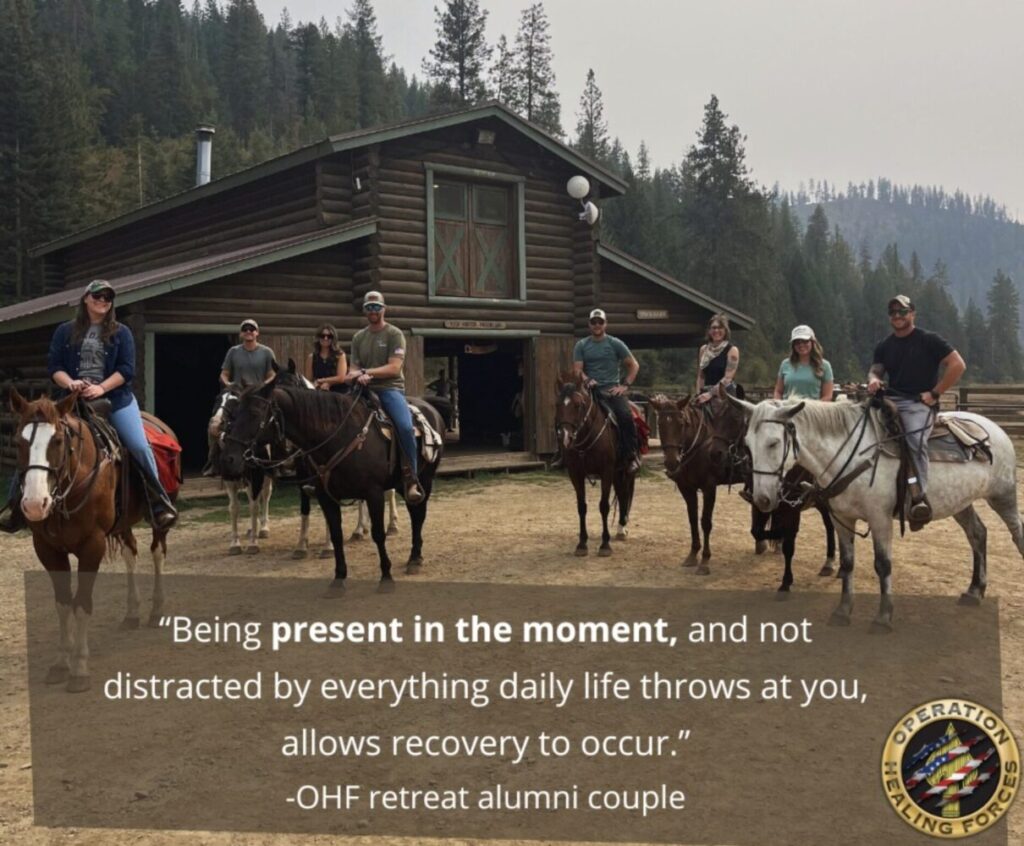
Support Beyond the Retreat
Operation Healing Forces understands that caregiving doesn’t end when the retreat does, and neither should support.
In addition to their retreats, OHF offers a range of ongoing caregiver resources:
- Immediate Needs Program: Providing financial assistance for emergencies, travel, medical supplies, and respite support.
- HatchPath Behavioral Health Coaching: A virtual wellness platform offering customized coaching in resilience, stress management, nutrition, life balance, and more. This resource is available at no cost to approved caregivers and SOF family members.
One of the most unique aspects of OHF is that 100% of donations go directly to programs, not overhead. This means more direct impact and deeper care for the people who need it most, including you.
You Are Eligible And You Deserve This
If you are caring for a wounded, ill, or injured SOF service member or veteran, or if you are a spouse or family member supporting someone in that category, you may be eligible to apply for an OHF caregiver retreat or support program.
The application process is simple. Share your story, complete the intake form, and request the support that fits your needs. Retreat spots are limited, so early applications are encouraged.
Many past participants describe the experience as life-changing. Some report feeling renewed hope. Others say they found the clarity, energy, and connection they had been missing for years.
A Stronger Network Through Mission Roll Call
Operation Healing Forces is proud to be a partner of Mission Roll Call to impact the lives of more veterans, military families, and supporters.
Through this partnership, you can find OHF listed in the Mission Roll Call Resource Directory, along with many other vetted organizations that serve the veteran and caregiver community. Whether you’re looking for legal resources, mental health support, financial aid, or peer connections, the directory is a one-stop shop for real, accessible help.
Explore it here: Mission Roll Call Veteran Resource Directory
Take the First Step Toward Your Own Healing
Your journey as a caregiver matters. Your health, your peace, and your purpose are just as important as those you care for.
Visit operationhealingforces.org to learn more about the Caregiver Retreat Program or to apply today. Don’t wait until you’re burned out or breaking down. Give yourself the gift of healing, connection, and rest. You have carried others for so long. Let someone carry you for a change.
At Mission Roll Call, veterans consistently tell us that mental health and suicide prevention are their top priorities. These are not abstract statistics or distant issues — they are real challenges that affect real people, every single day. That’s why it is critical to hear the lived experiences of veterans and amplify their voices.
Stories like Don Legun’s not only shed light on what it feels like to live with depression but also help others recognize warning signs in themselves or their loved ones.
Meet Don Legun
Lieutenant Don Legun is no stranger to discipline, resilience, and achievement. Before his military career, he was an elite college gymnast and a respected gymnastics coach, known for bringing out the best in his athletes. He also taught high school industrial arts, investing in young people and building confidence both inside and outside the gym.
When the opportunity arose to fly, Don changed course. He went through Aviation Officer Candidate School and became a Naval Flight Officer (B/N), flying the A-6 Intruder. Over his 10-year career, he logged more than 1,000 flight hours, completed 200 carrier landings, and deployed three times. He later taught marketing and sales in the Officer Recruiting Command, and then managed flight schedules and coordinated training exercises for deployed air wings.
After leaving the Navy, Don’s entrepreneurial spirit led him to open a windsurfing and kite shop and launch an award-winning “Learn to Windsurf” school. He also volunteered in local classrooms, using kites to teach kids the principles of flight.
In the final months of Don’s service, he incurred a new battle to conquer. Due to environmental and emotional events while serving, depression entered his life. While this underlying challenge often undercuts his drive, it has also fueled a deeper purpose: to understand his own journey and share it so that others might survive theirs. As Don puts it, “It provides purpose for my pain.”
Don also writes and speaks about his experience, including in his book, My Side of Depression.
Mapping the Experience
For years, Don searched for ways to understand and manage his depression. During one particularly difficult period of medication adjustment, he began to notice a pattern. His depression didn’t simply arrive in an instant — it unfolded step by step. Small shifts were built into more consuming changes until he felt cut off entirely.
So he started keeping track. Each time his depression deepened, he wrote down what he was experiencing. Over time, he realized that his journey wasn’t random. It followed a recognizable sequence.
What he discovered has resonated with other veterans and civilians who’ve read his work. Many said they saw themselves in his description, recognizing familiar patterns in their own lives.
The Depression Progression
Depression looks different for everyone, but Don’s careful notes highlight how it can progress if left unrecognized or untreated. Here are 17 common signs (broken into 7 categories) to watch for in yourself or in someone you care about:
DISTANCING
- Lack of eye contact – avoiding meeting eyes in conversation, looking down often.
- Disengagement – no longer starting conversations; giving short, closed responses.
- Anxiety or restlessness – a tense, on-edge feeling, like the body is fighting itself.
- Seeking solitude – turning off music, withdrawing to a bedroom or quiet space.
FATIGUE
- Fatigue – feeling tired all the time, lacking energy for normal activities.
SHORT FUSE
- Irritability – snapping at others, becoming frustrated over small things.
- Frustration – nothing feels satisfying; a sense that life is working against you.
- Impatience – low tolerance for mistakes, responding with quick anger.
UNPROVOKED ANGER*
- Persistent anger – staying angry without a clear reason; feeling like a different person.
- Anger turned inward – frustration with oneself for not “being normal,” which fuels more rage.
SELF-RECOGNITION
- Loss of joy – activities, music, or hobbies that once brought happiness now feel empty or painful.
- Awareness of impact – recognizing that your mood is dragging others down but feeling powerless to change it.
DETACHMENT
- Avoidance of others – pulling away socially, feeling out of place, or being unable to connect.
- The “curtain” effect – a sense of being cut off from the world, able to see it but not engage with it.
- Isolation – ignoring calls, staying in bed, sleeping excessively, limiting interactions.
GIVING UP
- False comfort – growing used to withdrawal and convincing yourself it’s fine to be left alone.
- Suicidal thoughts – believing you are a burden, thinking of ending your life, and even planning it.
These signs don’t always appear in the same order, and not everyone will experience all of them. But being aware of the progression can make it easier to notice shifts sooner, and step in with support before things reach a crisis point.
One of the most important lessons Don learned is that support isn’t a straight line. That’s why Mission Roll Call created a Mental Health Thermometer, a companion tool that visualizes these stages and shows how different types of support can help at any point along the way.
The resources on the thermometer aren’t listed in order, because there is no single “right” way to get help. Depending on where you are in the progression, you might use one, several, or all of these options at different times:
- Friend in Confidence: Sometimes the first step is the simplest: talking to someone you trust. Opening up to a friend or loved one can help you process what’s happening before it deepens.
- Peer Groups: Shared experience matters. Connecting with others who’ve walked similar paths can reduce isolation and remind you that you’re not alone.
- Counselor: A licensed counselor can help you recognize patterns, develop coping tools, and work through underlying issues.
- Seek Professional Help: If symptoms persist or worsen, reaching out to a mental health professional, such as a psychologist or psychiatrist, can make a meaningful difference.
- Psychologist: Talk therapy is often the first step. Psychologists help you recognize patterns, develop coping tools, and work through underlying issues in a non-medical setting. They can also advise when additional treatment may be helpful.
- Psychiatrist: If medication is recommended, either by a psychologist or another doctor, a psychiatrist is the specialist best equipped to prescribe and manage mental health medications. They monitor side effects, adjust doses, and guide you through the process. Medication is not one-size-fits-all, so professional oversight is essential.
- Hospital: If you feel unsafe with your thoughts or believe you might act on them, going to the hospital is a vital and life-saving choice.
*A note on safety: If you’re experiencing intense, unprovoked anger or emotional outbursts that feel beyond your control, taking proactive steps to protect yourself and others is an act of strength, not weakness. Consider storing firearms or other weapons securely, with access managed by a trusted person who understands your situation. Depression can distort thinking and override logic, and limiting immediate access to lethal means during volatile periods can be a powerful preventive measure.
Above all, help is always available. If you or someone you know is thinking about suicide, call the Suicide & Crisis Lifeline at 988 (press 1 for the Veterans Crisis Line). This free, confidential support is available 24/7.
Why It Matters
Don’s courage in naming his stages and sharing them openly is exactly why Mission Roll Call exists. When veterans tell us that suicide prevention is a top priority, we don’t just listen. We amplify voices like Don’s to bring understanding, resources, and hope to others.
Depression can feel isolating, but as Don shows, even in the darkest stages, there is a way to recognize what is happening and reach for help.
This is just the beginning. Mission Roll Call will continue to share more articles and resources in partnership with Don and other mental health thought leaders, so together we can advance awareness, prevention, and support for every veteran and family.
If you or someone you know is struggling, call the Suicide & Crisis Lifeline at 988 (press 1 for the Veterans Crisis Line). You are not alone.
Veterans occupy a unique place in American life because they accepted risks that no other group is asked to bear. When someone raises their hand to serve, they agree to face injury, separation, trauma, and the possibility of death. That decision changes the moral contract between the nation and the individual. Veterans’ benefits are not handouts; they are part of the bargain that sustains our all-volunteer force and tells every service member that if they carry the weight of war, their country will carry them afterward.
Disability compensation is not an entitlement. It is a debt the nation agreed to pay the moment each of them took the oath. These benefits exist to make whole those who carried the cost of national defense in their own bodies and minds, not as income support or welfare. The rest of America lives in the safety and prosperity those service members helped secure. Fulfilling that obligation is how a nation keeps its word.
VA disability ratings were never designed to rank sacrifice or measure virtue. Rather, they are meant to reflect average impairment in earning capacity. This is why some disability ratings comparisons can appear counterintuitive. In addition, certain combat-related injuries, like limb loss, qualify veterans for additional categories of compensation and care that are not captured in a base rating.
The wars of the past twenty years reshaped the landscape of military service. These were not mass armies trading fire across open battlefields. They were small, repeatedly deployed teams under constant psychological and environmental stress. Blast exposure, moral injury, and sustained hyper-vigilance rewired how modern medicine understands the effects of combat.
Advances in triage and battlefield medicine saved thousands who would not have survived in earlier wars, but survival came with new and complex injuries. For example, polytrauma, traumatic brain injury, chronic pain, and long-term mental health effects that often emerge years later. The rise in disability claims is proof of scientific progress, not deceit. We now understand that injuries to the brain, the endocrine system, and the psyche are real wounds of war, and our system must evolve to meet that truth.
Even seemingly ordinary conditions for most Americans take on a unique aspect when acquired through this dedication to service and answering the call. Equating these conditions as being equal to the average Americans’ experience discounts the additional risk all servicemembers are subject to while serving. Repeated blast exposure, toxic burn pits, and high operational deployment stress are only encountered in the military and have lasting effects on multiple body systems. Addressing these conditions fulfills the promise to care for those whose health was compromised in service.
Every large federal program encounters fraud, and veterans’ benefits are no exception. But the number of confirmed cases is statistically microscopic compared to the millions of legitimate claims filed each year. To portray those rare offenders as representative of all veterans is both inaccurate and insulting. We already have laws to punish fraud, and those cases should be fully prosecuted. Accountability builds confidence—but it should never be used to question the integrity of an entire community, particularly our veteran community.
This debate reaches beyond money. The strength of our all-volunteer force depends on trust: the belief that if you serve and sacrifice, your country will stand behind you. When veterans are treated as suspect or their earned benefits are framed as waste, that trust erodes. Every recruit’s decision is shaped by how they see veterans treated. Recruitment shortfalls across every branch already show how fragile that trust has become.
VA Secretary Collins and his team are working to fix long-standing issues across the VA, from processing over 100k backlogged claims, to claims and records modernization, to staffing and infrastructure. These are not problems that can be solved overnight or through headlines; they require precision, patience, and bipartisan support. Modernization done right means a VA that is faster, fairer, and worthy of the people it serves.
Veterans kept their promise to the nation. The nation must keep its promise to them.
When transitioning from military to civilian life, education is often one of the first steps toward building a new future. The GI Bill helps thousands of veterans each year by covering tuition, housing, and other costs. But there is an additional benefit many do not know about: the GI Bill “Kicker,” also known as the College Fund.
At Mission Roll Call, we believe every veteran deserves to get the most out of the benefits they’ve earned. The Kicker is one of those tools that can make a real difference, especially when managing school and everyday expenses.
What Is the GI Bill Kicker?
The GI Bill Kicker is extra money added to your GI Bill payments. It is not a standalone benefit, and you can’t use it by itself. It must be awarded by your service branch, often as part of your enlistment, reenlistment, or a contract addendum, and properly documented so the VA can include it in your payments.
Each service branch sets its own rules for who qualifies. Some tie it to specific jobs, enlistment duration, or duty locations. Once approved, the Department of Veterans Affairs (VA) processes it as part of your monthly GI Bill benefits.
How Much Could You Receive?
The Kicker can add up to about $950 per month under certain contracts and branches. That additional money can help pay for rent, food, school supplies, or other everyday costs. The actual amount varies based on your service branch, specialty, and contract terms, but it is a consistent monthly increase for as long as you are using your GI Bill.
To receive it, you must be eligible for and actively using your GI Bill benefits. The Kicker cannot be claimed separately.
How It Works with Your GI Bill
The way the Kicker is paid depends on which GI Bill program you are using.
- If you are using the Post-9/11 GI Bill (Chapter 33), the Kicker is added to your Monthly Housing Allowance (MHA), but only if you qualify for housing payments. If your enrollment or program makes you ineligible for housing (such as when enrolled in online-only classes), you may not receive the Kicker because there is no housing allowance to add it to.
- If you are using the Montgomery GI Bill (Chapter 30), the Kicker is added directly to your regular monthly education benefit.
In both cases, the Kicker is tied to your overall GI Bill eligibility and is only paid while you are actively receiving GI Bill benefits.
Why Many Veterans Miss Out
Many veterans are never told about the Kicker or forget they signed up for it. Since the Kicker is determined by the service branch and not the VA, it is not automatically included in your benefits unless your paperwork is in order. If the VA does not receive the enlistment or reenlistment documentation showing your College Fund eligibility, it will not be added to your payments. That means you might be missing out on money you have already earned.
How to Make Sure You Get It
If you think you might qualify for the GI Bill Kicker, here are a few steps to follow:
- Check your enlistment or reenlistment contract (or any addenda) for “College Fund” or “Kicker” language.
- Submit your contract to the VA when applying for GI Bill benefits.
- Review your monthly payments to make sure the Kicker is included.
- Contact a VA education counselor if you have questions about your eligibility.
- If still serving, ask your education or incentive office about your options.
Conclusion
The GI Bill Kicker is a valuable tool that can provide real financial support during your education journey. Many veterans are eligible but never receive it simply because they did not know it existed or forgot to submit the paperwork.
Mission Roll Call is committed to ensuring that veterans receive the full support they have earned. If you believe you are eligible for the Kicker, take the time to confirm it and follow up with the VA. A few simple steps could lead to hundreds of dollars more each month as you work toward your next goal.
September marked a solemn and significant month for Mission Roll Call as we focused on resilience and remembrance. Twenty-four years after the attacks of September 11th, we honored the lives lost, reflected on how that day continues to shape our nation, and elevated the voices of veterans and families whose service and sacrifice have defined the two decades since.
Here’s what you might have missed:
Honoring Service and Sacrifice
We began the month by honoring Michael Verardo, whose courage on the battlefield and tireless advocacy at home continue to inspire lasting change. We also reflected on the impact of September 11th, 24 years later, and how that day continues to shape veterans, their families, and the country they served.
– Honoring Michael Verardo: A Legacy of Courage and Advocacy
– 24 Years Later, The Impact of September 11th Endures
Mental Health and Suicide Prevention
National Suicide Prevention Week served as a critical reminder of the work still ahead to support veterans in crisis. We highlighted both the ongoing gaps and the innovative solutions that can make a difference, from technology-based support tools to community-driven approaches.
– National Suicide Prevention Week: Standing Up for Veterans, Together
– Digital Tools for Wellness: How Tech Is Reshaping Veteran Mental Health
Care, Healing, and Quality of Life
We also focused on stories that reflect the broader needs of the veteran community. Access to TBI care, the transformative impact of service dogs, and the ongoing efforts to improve support for caregivers all play a vital role in quality of life after service.
– TBI Care Remains Out of Reach for Too Many Veterans and Caregivers
– How Service Dogs Transformed A Veteran’s Life
Community, Policy, and Advocacy
Finally, we shared how veterans continue to lead in their communities and shape policy. Whether building networks of support in remote areas or weighing in on critical debates in Washington, their voices are driving real change.
– How a Navy Veteran is Building Community in the Mountains
– Don’t Put Veterans in the CR Debate Crossfire
The Lasting Mission Podcast
September featured one of our most meaningful podcast episodes to date. In a special 9/11 tribute, The Lasting Mission brought together one service member from each branch of the U.S. military to share how that day changed their lives, their service, and the nation they swore to defend.
Their stories are deeply personal — where they were on September 11, 2001, how it shaped their decision to serve, and how its legacy continues to influence their families, communities, and missions decades later. Together, they remind us why remembrance is not a single day on the calendar but a continued commitment to those who answered the call.
– The Dust That Never Settled: An Army Veteran’s 9/11 Story
– One Nation, Five Voices: Veterans Reflect on 9/11
Mission Roll Call University (MRCU)
MRCU continued to deliver practical and accessible resources to support financial literacy and planning for veterans and their families. September’s videos broke down investment fundamentals and demystified how the stock market works.
– WATCH: How the Stock Market REALLY Works – Financial Literacy
– WATCH: Investing – Risky Gamble or Smart Move?
– READ: Veteran Financial Readiness and Literacy: Building Peace of Mind
Veteran Town Hall: Your Voice in Real Time
Our September Town Hall brought veterans together to discuss critical issues like VA mental health support, access to care in rural communities, and improving transition services. These conversations, led by CEO Jim Whaley and COO Ray Whitaker, help shape our advocacy and ensure veteran perspectives are heard where decisions are made.
– Watch the September Town Hall
MRC in the Media
Mission Roll Call continued to amplify veteran issues in the national conversation. This month, The National Desk highlighted the VA’s $818 million initiative to combat veteran homelessness, a topic closely tied to the broader conversation around access to care and post-service support.
– The National Desk || VA Announces $818 Million to Combat Veteran Homelessness
Speak Up: Your Voice Matters
Your input shapes our advocacy. This month, we launched a new survey focused on transition and VA enrollment to better understand the challenges veterans face when accessing care and benefits. Your feedback helps guide our work and ensures that policies reflect real needs and lived experiences. Share your voice with us below:
– Take the Transition and VA Enrollment Survey
Looking Ahead: Warrior Caregivers
In October, we’ll turn our focus to warrior caregivers—the spouses, parents, partners, and loved ones who support our nation’s heroes every step of the way. Their strength and sacrifice are vital to the veteran experience, and their stories deserve to be told. Stay tuned for more throughout the month.
Each September, Congress faces the same deadline. The fiscal year ends on September 30, and if lawmakers cannot agree on appropriations, they pass a continuing resolution, or CR, to keep the government funded. A CR is meant to be a bridge. Owing to political gridlock, too often it becomes a bargaining chip. When that happens, veterans risk getting caught in the crossfire.
This year’s Continuing Appropriations and Extensions Act, 2026, carries more than budget numbers. It extends the Department of Veterans Affairs’ authority to operate programs that directly serve the most vulnerable veterans. Without passage, those authorities expire at the end of the month. If they expire, lifelines disappear overnight.
One example is the Staff Sergeant Parker Gordon Fox Suicide Prevention Grant Program. These grants fund community organizations that reach veterans outside VA walls. They support peer networks, local outreach, and prevention specialists who connect with veterans in crisis. Many of these veterans may not walk into a VA hospital, but they will talk to a peer who has worn the uniform. Interrupting that network, even briefly, means lives are put at risk.
The Supportive Services for Veteran Families and Health Care for Homeless Veterans programs are just as critical. They provide emergency housing, rental assistance, and case management for veterans already on the edge of losing stability. If those services stop, veteran homelessness rises immediately. For veterans struggling with mental health challenges, the result is dangerous and destabilizing.
Rural veterans face another risk. The Rural Access Network for Growth Enhancement (RANGE) program provides case management for veterans with serious mental illness who live far from traditional care. If RANGE falters, those veterans lose their only lifeline.
The CR also extends VA’s obligation to provide nursing home care for veterans with severe service-connected disabilities. That obligation is a national promise. Allowing it to lapse would break faith with those who carry the deepest wounds of war.
These programs are not line items on a spreadsheet. They are suicide prevention hotlines, housing vouchers, peer counselors, case managers, and long-term care beds. They are veterans’ safety nets. And they are all at risk if this CR fails to pass by the end of the month.
Veterans did not create the fiscal year deadline. They did not ask for their programs to be wrapped into political debates. They served their country, and in return their country made commitments that cannot be subject to delay or disruption.
This is a simple concept that all can rally behind. We cannot allow veterans’ care to become collateral damage in budget politics. Congress should pass the CR to keep these programs running and then complete the job of passing full-year appropriations. Larger debates about health care or spending priorities belong on separate ground, not tied to whether veterans at risk of suicide or homelessness receive help.
Veterans deserve certainty. They deserve to know that the programs designed to save their lives will not shut down because of a missed deadline. Keeping those programs funded is keeping faith with sacred promises made to our veterans.
You’ve served. You’ve sacrificed. Now, as you transition or have transitioned out of uniform, there is another kind of readiness that matters: financial readiness. It’s not just about making ends meet. It’s about understanding the tools available, building confidence in financial decisions, and securing long-term stability. With the right financial understanding, small steps become strong foundations. All veterans deserve that peace of mind.
Why Financial Readiness and Literacy Matter
Financial pressure is something many veterans quietly carry, especially during and after the transition to civilian life. Rising costs of living, unexpected medical bills, and navigating unfamiliar financial systems outside the military can quickly become overwhelming. In fact, a survey by Wounded Warrior Project found that 64 percent of their participants said they did not always have enough money to meet their basic expenses in the past year. This clearly shows many veterans are living under financial strain with limited room for error.
That strain does more than affect bank accounts. It weighs on mental health, too. Financial stress can increase anxiety, depression, and feelings of helplessness, especially when combined with other post-service challenges. While grants and assistance can offer short-term relief, true financial readiness comes from something deeper: literacy.
Understanding how to budget, build credit, invest wisely, and protect yourself financially gives veterans long-term tools, not just temporary fixes. It is that knowledge and the confidence that comes with it that can help transform instability into security.
What Financial Readiness Looks Like
Here are the core pieces that add up to true readiness:
- Know your benefits, inside and out
- Benefits from the VA, educational benefits, service-related support, insurance, and housing programs all matter. Sometimes benefits overlap. Sometimes, the details like eligibility, tax implications, and documentation matter more than people realize.
- Budgeting and cash flow management
- Track every dollar: income, obligations, discretionary spending
- Build a buffer: even a small emergency fund helps reduce the risk of a financial crisis
- Adjust as life changes: deployment, family additions, separation, or civilian jobs
- Credit, debt, and loans
- Understand what affects your credit score and work to keep it healthy (on-time payments, low credit card balances)
- Be cautious with high-interest lenders
- Know your student loan or GI Bill options and repayment plans, if applicable
- Investing and long-term planning
- Retirement savings (for example, TSP or IRAs) are tools for growth, even if contributions are modest at first
- Diversify when possible, based on your risk tolerance and timeline
- Understand basic stock market principles so you can evaluate opportunities and avoid pitfalls
- Planning and protection
- Estate planning: wills, power of attorney, beneficiary designations
- Insurance: health, life, disability — know what is covered and what is not
- Fraud prevention: identity theft, scam awareness, and understanding your rights, especially when dealing with VA or contracting organizations
Spotlight: Effective Programs and Resources
These programs and tools can help veterans build financial literacy and readiness:
- Mission Roll Call’s “How the Stock Market REALLY Works”, a friendly, beginner-oriented video to help veterans make sense of investing
- Veteran Benefits Overview in 2024 breaks down benefit programs and eligibility clearly
- FINVET (National Veterans Financial Resource Center) helps veterans find trusted financial tools, learn best practices, and navigate their financial path
- Wounded Warrior Project’s Financial Readiness Program offers one-on-one counseling, budget planning, and tools for managing unexpected costs
- Office of Financial Readiness (FINRED) offers courses, resource libraries, and materials for all stages of military and post-military life
Practical Steps You Can Take Now
You don’t have to overhaul everything at once. Here are simple actions you can take today:
- Start small with budgeting: For one month, write down everything you spend. You’ll often spot easy areas to cut, such as unused subscriptions, banking fees, or impulse buys
- Automate what you can: If possible, have a portion of your income go directly into savings or investments
- Set clear, achievable goals: Examples: “Save $500 emergency fund in 3 months,” or “Reduce credit card debt by 25 percent in 6 months,” or “Watch one video per week to learn investing basics”
- Seek trustworthy mentorship or counseling: Use vetted resources that understand military and veteran needs
- Educate before big decisions: Whether buying a house, switching jobs, investing, or taking out loans, take time to research, compare options, and ask questions
- Protect yourself: Monitor credit reports, guard your identity, and understand what you are signing before entering any agreement. Know your rights under VA programs and military law, such as the Servicemembers Civil Relief Act
Empowering Your Financial Journey
Start with Mission Roll Call University. Watch the video How the Stock Market REALLY Works to build a solid and approachable foundation in investing. Then explore the Veteran Benefits Overview for 2024 to fully understand what benefits are available to you and how to access them.
Reach out to organizations like the Wounded Warrior Project, VeteransPlus, or FINVET to schedule a free or low-cost counseling session, or browse the resources in MRC’s Veteran Resource Directory. Choose one financial goal, whether it’s saving, paying off debt, or building credit, and take that first step toward achieving it.
Conclusion
Financial readiness is not about having a lot of money. It’s about having the right knowledge, healthy financial habits, support systems, and the mindset to stay steady through challenges. It’s about being able to breathe easier, sleep better, and face the unexpected with confidence. You earned that.
You may use grants and benefits, and those matter. But it is financial literacy that turns short-term relief into long-term security. The tools are out there. So are the people who understand what you’re navigating. Taking that first step may feel small, but it can lead to something steady and strong.
Subscribe to Mission Roll Call University (MRCU) to explore Mission Roll Call’s financial resources today and take the next step toward financial peace of mind.
A 2025 poll conducted by Mission Roll Call revealed that 74% of veterans would use an online healthcare portal if one were available, a resounding signal of demand for streamlined, digital-first care access.
 From portals and apps to telehealth and peer platforms, digital tools have the potential to reshape mental health care for millions. This article explores what’s available, trustworthy, and shaping the future of veteran wellness.
From portals and apps to telehealth and peer platforms, digital tools have the potential to reshape mental health care for millions. This article explores what’s available, trustworthy, and shaping the future of veteran wellness.
The Veteran Mental Health Landscape
Veterans frequently navigate mental health challenges such as PTS, depression, anxiety, and the stress of reintegration into civilian life. Roughly 20% of veterans from Iraq and Afghanistan experience PTS or depression, and just under half of all veterans receive needed treatment.
Mission Roll Call emphasizes that stigma, isolation, and complex systems often compound these struggles. The ACCESS Act polling underscores a clear veteran preference for digital tools that make care easier and more accessible.
Online Healthcare Portals
One of the clearest starting points has been online healthcare portals. Digital platforms promise convenience, privacy, and agency. The VA’s Access to Care platform offers transparency to veterans navigating care choices.
Additionally, in 2025, the VA eliminated the secondary-approval hurdle for community care referrals, speeding access to external providers under the MISSION Act. Together, these changes point toward a system that is simpler and more responsive.
For veterans who don’t qualify for or can’t easily access VA care, MyRX Access Plus has emerged as an additional option. The platform connects veterans and their families to affordable prescriptions and healthcare resources outside the VA, aligning directly with the 74% who say they would use an online portal if available.

Mental Health Apps
Some of the most widely used tools live right on a smartphone. From helping manage trauma symptoms to coping with anger, apps such as PTSD Coach, Calm, Headspace, and others offer personalized support. Their credibility hinges on clinical backing, research evidence, and robust privacy standards. Explore this list of Mental Health and Behavioral Therapy apps for veterans and their families.

Beyond portals, a growing number of technology tools are empowering veterans with easy access to providers, self-help, and care tracking, which is particularly appealing to those in rural or underserved areas. Digital care doesn’t replace human connection—it extends it, making support possible at moments when veterans need it most.
In case you didn’t know, the VA has an App Store that provides access to over 40 web and mobile apps designed for Veterans, their families, and VA providers. These apps cover a range of services, including health and wellness, benefits information, symptom tracking, and tools to facilitate communication with VA providers. You can find these apps, which include native apps for iOS and Android and web apps accessible through a browser, at mobile.va.gov/appstore.
Peer Support Online
Technology also provides spaces where veterans can connect with one another. Online forums and moderated peer platforms foster a sense of belonging and mutual understanding. Veterans often find strength in shared stories and lived experience. A few examples of peer platforms to check out are:
- America’s Warrior Partnership (AWP), which offers a national network of support and resources that includes peer-to-peer connections.
While primarily an advocacy organization, Mission Roll Call plays a unique role in amplifying veterans’ mental health needs. Through polling, storytelling, and media outreach, MRC creates a sense of community by bringing attention to struggles like suicide risk and care access.
Supporting Veteran Families and Caregivers
Behind every veteran navigating mental health challenges is often a circle of support: spouses, partners, children, parents, and caregivers–whose needs are frequently overlooked. These individuals are critical to long-term recovery and wellness, yet they, too, can face emotional strain, burnout, and a lack of resources. Some digital platforms are beginning to close this gap.
- VA’s Caregiver Support Program offers online resources, peer mentoring, and telehealth coaching for those supporting post-9/11 veterans.
- Military OneSource provides 24/7 access to confidential counseling, educational webinars, and caregiver-specific content.
- Apps like MoodCoach and PTSD Family Coach are designed to help loved ones understand symptoms, manage stress, and provide appropriate support without sacrificing their own well-being.
Inclusive technology matters because wellness rarely exists in isolation. Tools that extend access to families and caregivers can help create a more sustainable and informed support network.
Looking Ahead: What’s Next in Digital Veteran Wellness
Looking ahead, the future of digital wellness for veterans is filled with hopeful possibilities. Tools are beginning to offer gentle, everyday check-ins that create small moments of connection that can make a big difference before things become overwhelming.
Virtual reality and biofeedback – a process that uses your body’s own signals like heart rate and body temperature to bring about healthy changes – are also stepping in, helping veterans process difficult experiences in safe, controlled ways while staying in tune with how their bodies respond to stress. And on the horizon is something many have long hoped for: a more seamless, personalized experience, where the tools veterans use can actually talk to each other, making care feel less like a maze and more like a path forward.
Conclusion
The demand is clear—three out of four veterans say they would use digital healthcare tools if available. For providers and advocates, the challenge is ensuring tools are accessible, trustworthy, and responsive to veteran needs.
Digital tools aren’t a foolproof solution; connectivity issues, device access, and tech literacy can all hinder adoption. Emerging hybrid models, combining digital tools with in-person support and partnerships between the VA and community organizations, may help bridge these gaps.
Whether you’re a veteran navigating your own path to wellness, a loved one standing beside them, or someone working to build better tools, there’s a place for you in this growing digital ecosystem.
Veterans can find strength and support in the trusted apps and telehealth services already at their fingertips. Families and caregivers are not forgotten; many platforms offer guidance and resources to help you care for those you love while also caring for yourself. And for those developing the next wave of solutions: listen closely to veteran voices, and build with empathy, security, and the full circle of support in mind.
For many veterans, service dogs are more than companions; they’re a quiet kind of safety. That has been true for Mission Roll Call’s own Taamir Ransome, whose path to service dogs began years before he joined the MRC team.
Taamir enlisted in the Army in October 2001, only weeks after the attacks of September 11. What started as a technical track in radar repair quickly shifted into combat deployments with the 82nd Airborne, then into explosive ordnance disposal (EOD). He eventually earned a place in a special mission unit, becoming the first Black Tier 1 EOD operator in history. Over the course of 22 years, he deployed repeatedly, survived blasts and crashes, and carried the physical and invisible weight of a long career in special operations. In 2021, after surgery to rebuild his foot, he medically retired.
Transition was harder than expected. “When you get out of the military, you lose your adrenaline, your purpose, and your tribe,” Taamir said. “I was doing pretty bad.” Therapy helped, as did friends who made sure he wasn’t isolating. The steadying force, though, came with a service dog.
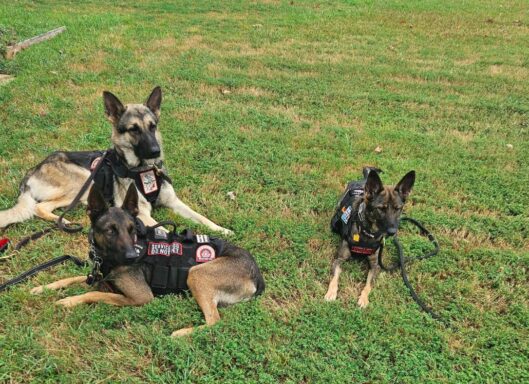
His first dog, Dimos, was trained and placed through a nonprofit that works with the special operations community. The bond was immediate. “He makes me feel safe. He watches my back. I don’t have to be wound so tight because I know he’ll give everything for me.” Hypervigilance eased. Structure returned. And for the first time in years, Taamir felt comfortable showing up in crowded community spaces—school dances, baseball games, local events—with Dimos at his side.
Living with a service dog also revealed how many barriers remain for veterans. Taamir explained that misunderstandings about rights are common, from being asked for “paperwork” that doesn’t exist to skepticism about service dogs trained for PTS or anxiety. The VA does not provide consistent coverage for service dogs outside of narrow categories, leaving many veterans to rely on nonprofits or pay out of pocket. Education and access remain the largest gaps.
That’s why legislation like the SAVES Act matters. The bill is designed to make it easier for veterans to connect with accredited programs and receive the support they need, especially for conditions like post-traumatic stress. If passed, it would help address the lack of clear pathways Taamir and so many others have faced, creating consistency across the system so veterans aren’t left to navigate alone.
Rather than stop at his own experience, Taamir went a step further and began training dogs for others. Together with his son Mario, he works with German Shepherds, Giant Schnauzers, and other breeds, teaching obedience, stability, and readiness for public spaces. The work has become both therapy and connection. “Because of the dogs, me and my son are probably the closest we’ve ever been. Motorcycles, cars, dogs—that’s our thing.”
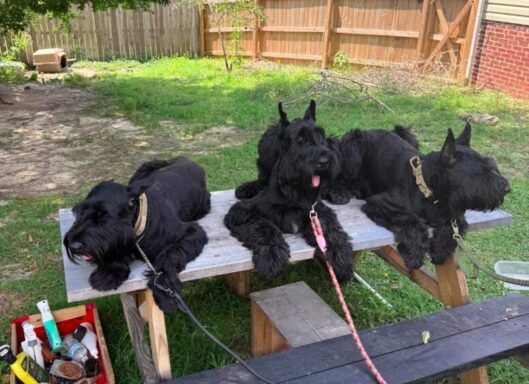
Today, Taamir manages a full pack: Dimos, Aries, Atlas, and Thanos, along with a steady stream of dogs he and Mario train for veterans and neighbors. Each one learns balance—discipline and reward, caution and calm. The goal is the same every time: to have dependable partners who rise to protect when called upon and bring calm when the moment passes.
Taamir’s role at Mission Roll Call now gives him the chance to amplify what he has lived—sharing his story, training alongside his son, and advocating for other veterans who could benefit from the same support. If you ask him what service dogs provide, he’ll keep it simple. Fewer nightmares. A reason to get up and keep a routine. A sense of safety that opens the door to being social. Stronger ties with his son, and the satisfaction of training dogs that go on to serve other veterans.
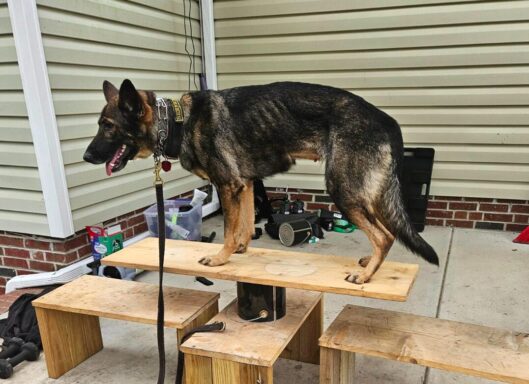
He also carries with him a favorite line about their nature: “Dogs have beauty without vanity, force without insolence, bravery without ferocity, and all the virtues humans have without any of the vices.”
On National Service Dog Awareness Day (Sept. 20), we celebrate veterans like Taamir who have found stability and purpose through service dogs, and the organizations and legislation working to expand access. Share your story with Mission Roll Call and help us build the awareness and action needed to ensure every veteran has a clear path to a trusted partner at their side.
Katt Whittenberger didn’t join the Navy for stability or even for a career. She joined for adventure. Growing up far from the coast, she remembers a recruiting commercial that promised exactly what she craved: the ocean, the unknown, and the chance to tell stories as a journalist.
Her first assignment landed her on the USS Theodore Roosevelt, a nuclear-powered aircraft carrier that felt like a floating city.

“I remember looking up at it and thinking, ‘How does this thing float?’ It’s four football fields long, and two-thirds of the ship is above water. It’s so intimidating,” she said.
The living quarters were cramped, with three-high racks stacked shoulder-width apart and only a tiny locker and shelf for personal items.
Space was limited, but the mission was big. The carrier had its own fire and police departments, post office, store, and morale and recreation programs. At sea, it became its own world, one where sailors worked hard, played hard, and forged bonds through long days and nights.
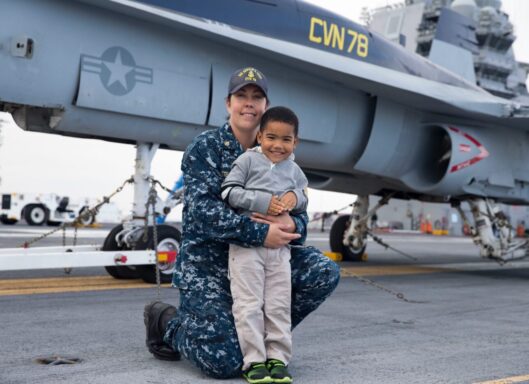
That world shifted dramatically after September 11, 2001. Just nine days after the attacks, Whittenberger’s ship deployed as one of the first to respond. Night flight operations filled the sky, a stark reminder of the gravity of what lay ahead. Technology was also changing during those years. For the first time, every sailor had an email address, offering a thin digital thread back home. Later deployments would bring cell phones and social media into the mix, reshaping how service members stayed connected even while oceans away.
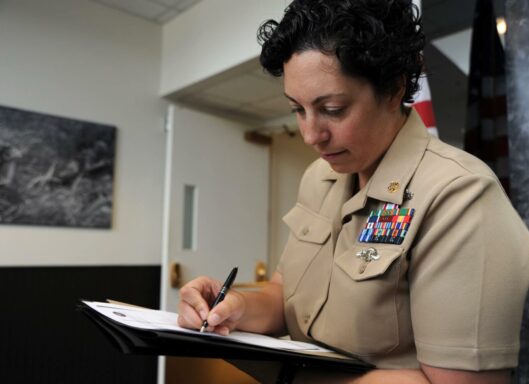
What started as a search for adventure became a 21-year career that carried her around the globe and through different eras of military life. She grew as the Navy grew, mentoring the next generation and adapting to new challenges until it was time to retire.
When she did, Whittenberger moved to rural Virginia to raise her son on a farm. She traded steel decks and crowded racks for open fields and quiet nights, but the isolation came at a cost.
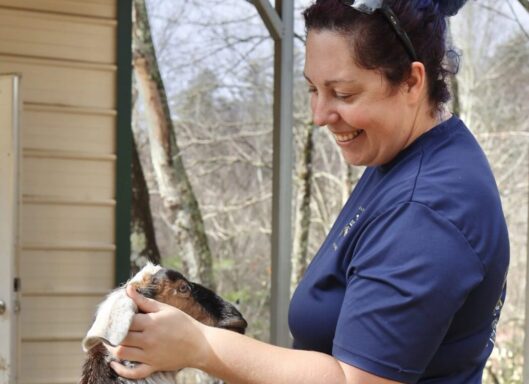
Accessing veteran resources proved difficult. Healthcare required long drives, reliable internet wasn’t always available, and administrative hurdles with the VA made navigating benefits exhausting.
The strong military identity she once carried now felt harder to hold onto. What she experienced, she realized, was not unique. It was a reality for countless veterans in rural America, especially those from the 9/11 generation.
Instead of waiting for solutions, she decided to build one. Alongside friends, Whittenberger co-founded Mountain Valor, a nonprofit dedicated to closing the gaps rural veterans face. Its signature event, Mountain Valor Fest, brings veterans and their families together each September in Floyd, Virginia, on the weekend closest to 9/11.
The festival is equal parts remembrance and celebration. A solemn flag retirement ceremony honors those lost and the sacrifices made, and the day quickly fills with other experiences: live music, food trucks, resource fairs, activities for children, and opportunities for veterans to connect with one another and with organizations that can help. It’s a space designed for families, but also for veterans who might otherwise feel cut off from the community and resources they have earned.
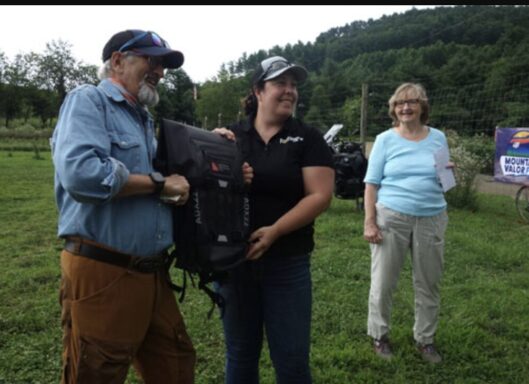
Whittenberger is quick to point out that rural veterans face obstacles their urban counterparts often do not. Healthcare facilities are farther away. Broadband access lags, and while the internet may sound like a solvable issue, mountains create dead zones where cell service doesn’t reach.
Many veterans simply are not aware of the full scope of benefits available to them. One reason is historical: Vietnam veterans often came home to find they were denied access to VA healthcare. Policies and laws have since changed, but the information hasn’t always reached rural America. Those same veterans are often retired now, and many qualify due to limited income, yet they remain unaware of their eligibility.
“Virginia is the worst state when it comes to health care, with the number of veterans who are fully eligible but have never applied because they don’t know about their eligibility,” Katt explained. “It’s so frustrating that there are so many limitations just getting rural veterans the support that they need.”
Mountain Valor exists to bridge those divides, creating events that are welcoming and engaging so that more veterans will show up, discover what is available, and get connected to the care and support they need.
Like her service in the Navy, Whittenberger sees Mountain Valor not as a short-term project but as a commitment to something larger than herself. Sustaining veteran support requires consistency, creativity, and the determination to adapt as needs evolve. Through her own journey, from chasing adventure at sea to navigating rural isolation, and now to building community in the mountains of Virginia, she embodies the resilience of her generation of veterans.
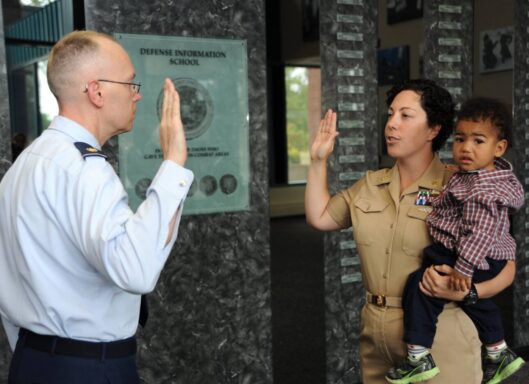
Her story is also featured in Mission Roll Call’s special 9/11 podcast episode, where she reflects on what it meant to deploy in the days following the attacks and how those experiences still shape her life today. Watch here
For veterans and organizations alike, Mountain Valor Fest is an open invitation. It takes place every year on the Saturday closest to September 11 in Floyd, Virginia. This year, it will be held on Saturday, September 13 at Crooked Mountain. Service providers and veteran families are welcome to attend, participate, and connect. More information is available at mtnvalor.org.
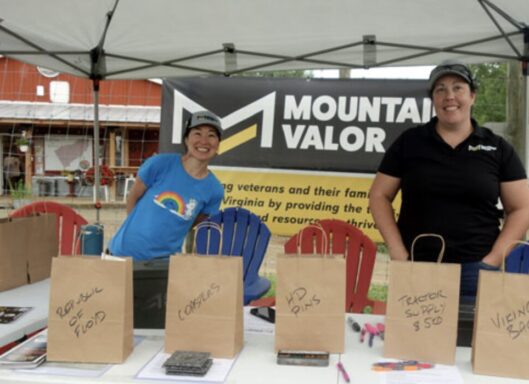
At Mission Roll Call, we believe voices like Katt Whittenberger’s matter. They remind us that veterans’ experiences do not end with their service. They evolve, often in ways that demand new solutions. By listening, learning, and amplifying these voices, we can build a stronger, more connected future for all veterans. Join us by sharing yours.